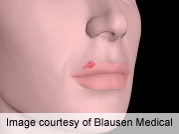- 7 Best Breads for Maintaining Stable Blood Sugar
- Gelatin vs. Collagen: Which is Best for Skin, Nails, and Joints?
- The Long-Term Effects of Daily Turmeric Supplements on Liver Health
- Could Your Grocery Store Meat Be Causing Recurring UTIs?
- Are You Making This Expensive Thermostat Error This Winter?
- Recognizing the Signs of Hypothyroidism
- 10 Strategies to Overcome Insomnia
- Could Artificial Sweeteners Be Aging the Brain Faster?
- Techniques for Soothing Your Nervous System
- Does the Water in Your House Smell Funny? Here’s Why
Frequent Cold Sores Tied to Genetic Mutation in Study


TUESDAY, Sept. 17A gene mutation explains why some people develop cold sores while others do not, according to a new study.
Cold sores — blisters that appear on and around the lips — are caused by the herpes simplex virus type 1 (HSV-1). Between 80 percent and 90 percent of people are infected with the virus, but only about one-quarter of them get frequent cold sores.
Scottish researchers analyzed blood samples from people affected by cold sores and found that they have a mutation in a gene called IL28b. This mutation means the body can’t mount an adequate immune response to HSV-1.
“Most people carry the cold sore strain of the herpes simplex virus, but until now we never knew why only some of them develop cold sores,” Professor Juergen Haas, of the University of Edinburgh, said in a university news release.
“Knowing that susceptibility to the virus involved relates to people’s genes reinforces the need to research not only the evolution of viruses themselves, but also the susceptibility of hosts to infection,” Haas said.
The study was published in the journal PLoS Pathogens.
The IL28b gene also is linked to treatment responses for hepatitis C patients. If this gene is mutated, patients are less likely to respond as well to treatment. The research provides further evidence that a single genetic mutation can be linked to different viruses, Haas said.
More information
The Nemours Foundation has more about cold sores.
Source: HealthDay
Copyright © 2026 HealthDay. All rights reserved.










